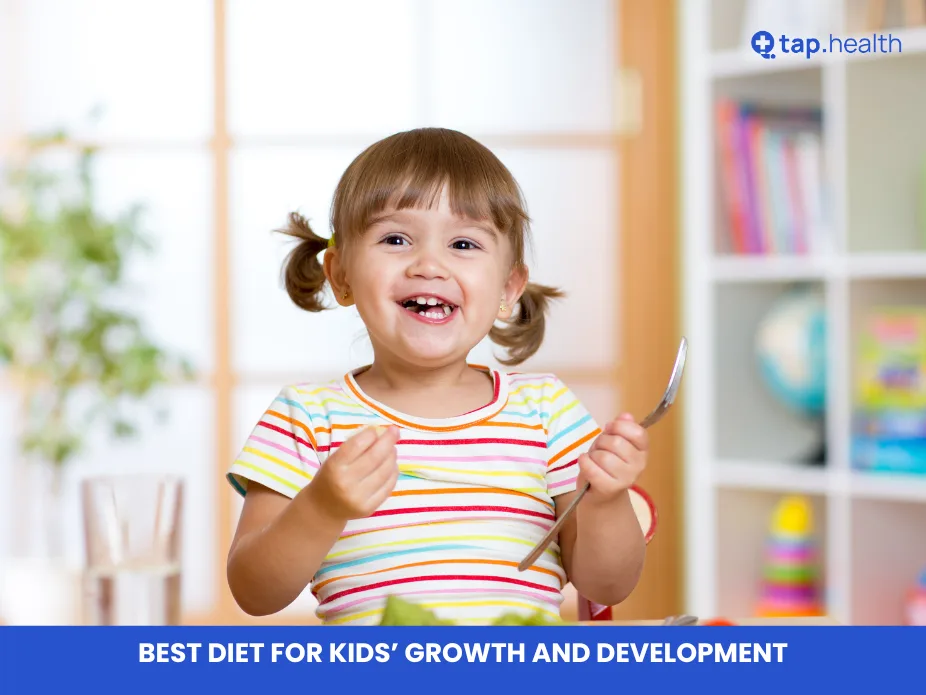Why Good Nutrition is Crucial for Kids’ Growth and Development
Proper nutrition fuels rapid physical and mental growth in children from birth to 18 years. It provides energy, building blocks, and nutrients for strong bodies, clear thinking, and robust health. Inadequate intake leads to stunted growth, weak immunity, cognitive delays, and future health issues. Studies show well-nourished kids excel academically, play actively, and adopt healthier habits long-term.
Key Nutrients for Kids’ Growth and Development: Protein as Building Blocks
Protein supports tissue repair, muscle building, and organ development, vital for active school-age children.
Protein Sources for Kids:
- Lean meats like chicken, turkey, beef
- Fish and seafood
- Eggs
- Dairy: milk, yogurt, cheese
- Plant-based: tofu, beans, lentils, quinoa, nuts
Daily needs: 19g for 4-8 years; 34-52g for older kids by age/gender.
Example: A 7-year-old soccer player recovers with yogurt and nuts or a turkey sandwich post-practice.
Carbohydrates: Energy Source for Active Bodies and Brains
Carbs supply primary fuel for muscles and brain, sustaining concentration and stamina.
Healthy Carb Sources for Children:
- Whole grains: brown rice, oatmeal, whole wheat bread
- Fruits: bananas, apples, berries
- Vegetables: sweet potatoes, carrots, broccoli
- Legumes: beans, lentils, peas
Prioritize complex carbs; limit simple sugars in candies, sodas, pastries to prevent crashes.
Pediatric nutritionist tip: Choose quinoa, brown rice, fiber-rich fruits/veggies for steady energy.
Healthy Fats: Support for Brain Development and Nutrient Absorption
Healthy fats aid cognitive function, learning, behavior via omega-3s and absorb vitamins A, D, E, K for bones, immunity, skin.
Sources of Healthy Fats for Kids:
- Fatty fish: salmon, tuna, mackerel
- Avocados
- Nuts/seeds: walnuts, chia, flaxseeds
- Oils: olive, coconut
Example: A 10-year-old boosts brain health with peanut butter-avocado sandwiches.
Vitamins and Minerals: Micronutrients Essential for Bone Health and Immunity
These power bodily functions, bone strength, energy, oxygen transport.
Key Vitamins and Minerals for Child Development:
- Calcium: Bones/teeth – dairy, leafy greens, fortified plant milk
- Vitamin D: Calcium absorption – sunlight, fatty fish, fortified foods
- Iron: Oxygen carry – lean meats, spinach, legumes
- Magnesium: Muscles/nerves – whole grains, nuts, greens
- Vitamin A: Immunity/eyes – carrots, sweet potatoes, spinach
Dietitian advice: Daily colorful fruits/veggies ensure broad nutrient coverage.
Hydration: Water Intake for Kids’ Daily Performance
Water transports nutrients, regulates temperature, removes waste; dehydration impacts focus, energy, school/sports.
Daily Water Needs by Age:
- 4-8 years: 5 cups
- 9-13 years: 7-8 cups
- 14-18 years: 8-11 cups
Opt for water, milk, 100% juices; limit sugary drinks.
Tips for Balanced Meals and Healthy Snacks for Children
Balance ensures complete nutrition.
Plate Method for Kids’ Meals: Half fruits/veggies, quarter protein, quarter grains.
Healthy Snack Ideas: Fruit, yogurt, nuts; avoid processed high-sugar/fat items.
Example: Apple with peanut butter or trail mix for after-school hunger.
Involve kids in cooking: Wash veggies, stir, choose recipes – builds skills, encourages eating.
Family coach insight: Cooking teaches healthy habits.
Limit sugar/junk: Occasional treats ok; excess causes weight gain, crashes.
Handling Picky Eaters and Active Kids’ Nutrition Needs
Picky 6-year-old avoids veggies: Fun shapes, smoothies, hide in favorites like pasta sauce with spinach/carrots.
Active 12-year-old athlete: Pre-game banana-nuts; post-game turkey sandwich-fruit for recovery, extra calories.
FAQ: Common Questions on Kids’ Nutrition and Growth
Q: How much protein should my child eat daily?
A: 19-52g based on age/activity; from meats, eggs, dairy, legumes.
Q: What are healthy snack ideas for kids?
A: Fruit-nut butter, yogurt-granola, veggies-hummus, mixed nuts for energy/nutrients.
Q: How to get kids to eat more vegetables?
A: Involve in cooking, vary forms (smoothies, baked), pair with dips; offer persistently.
Q: Is sugar bad for kids?
A: Excess leads to weight gain, decay, crashes; prefer fruit sweetness, limit snacks/drinks.
How Can TapHealth Help Manage Diabetes in Kids’ Diets?
A balanced diet sets lifelong health foundations. For growth, learning, play, prioritize proteins, fats, carbs, vitamins, minerals. Foster habits, fun mealtimes for sustained wellness.
For more expert advice and recommendations on kids’ nutrition, visit trusted sources like Healthline and The American Academy of Pediatrics.



